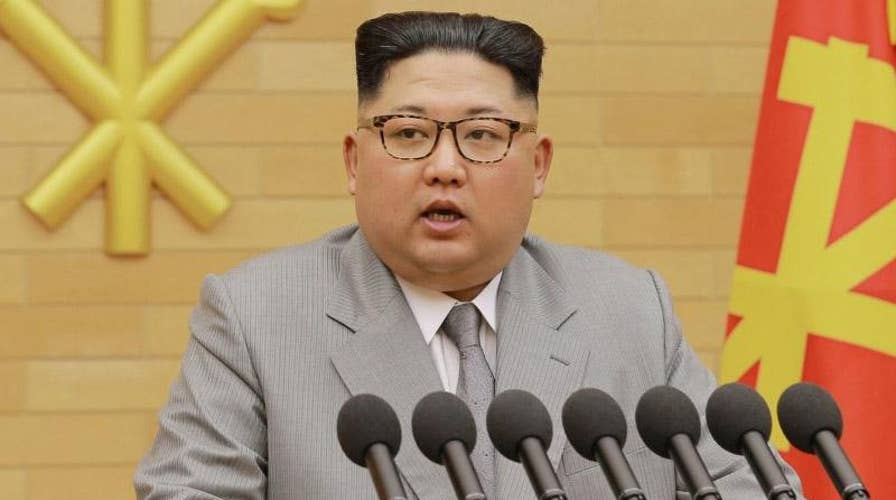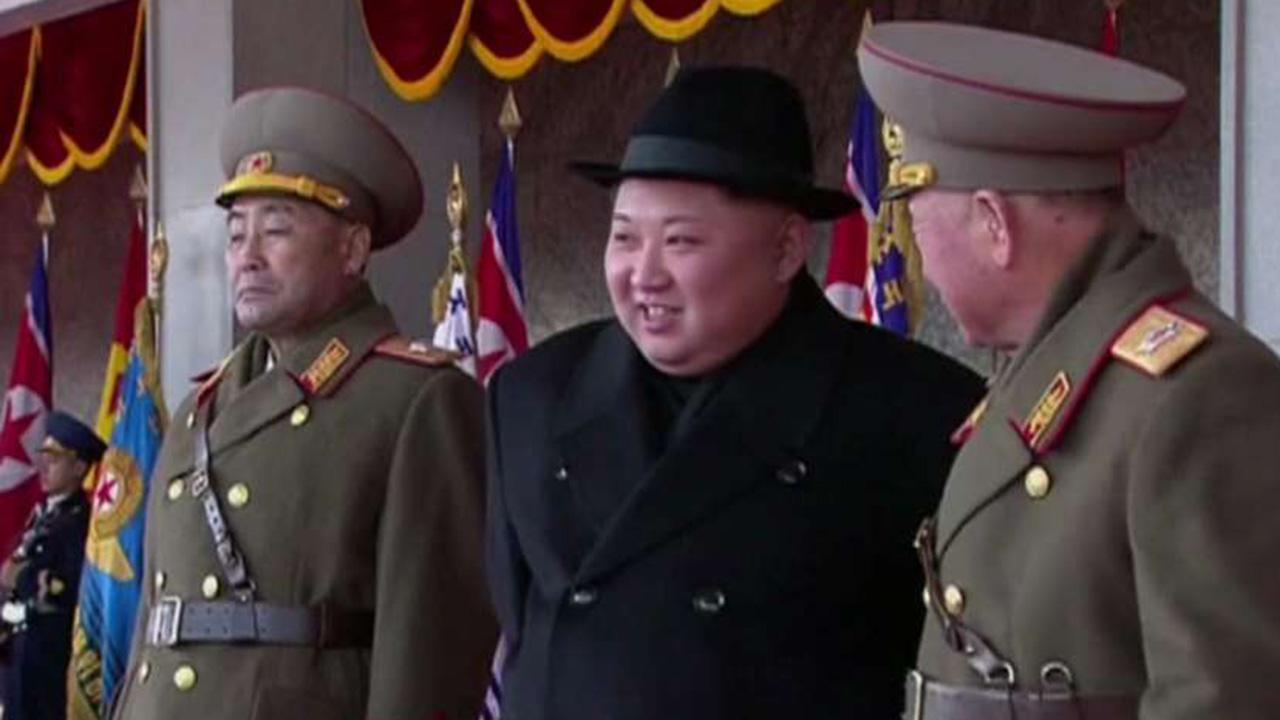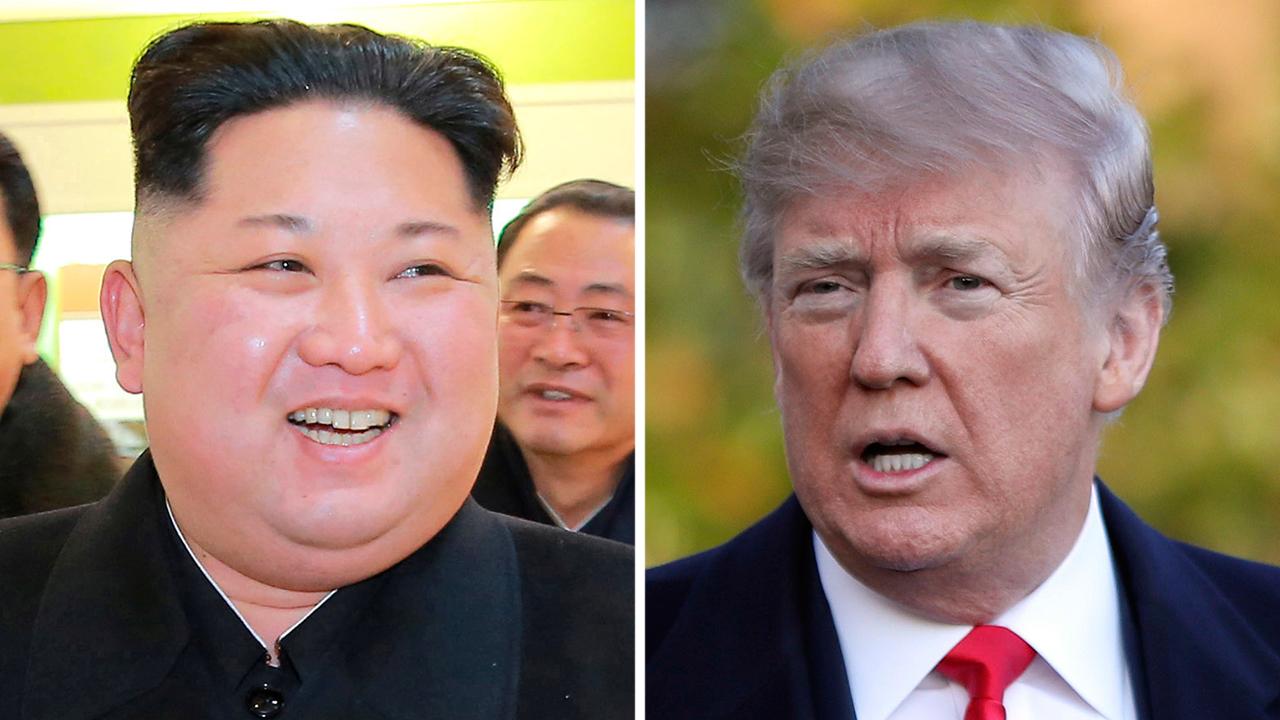China, North Korea confirm Kim Jong Un's visit to Beijing
Chinese state media reports Kim told President Xi he is committed to a nuclear-free Korean peninsula and is willing to discuss the issue with the U.S.; Rich Edson reports from the State Department.
White House spokeswoman Sarah Sanders said Wednesday that “we feel like things are moving in the right direction” heading into a planned summit between President Trump and North Korean dictator Kim Jong Un in May. If the meeting takes place, it will confront the U.S. president with the consummate test of his skills as a dealmaker, since no one has played American negotiators for fools more consistently than the North Koreans.
Kim’s meeting in Beijing this week with Chinese President Xi Jinping moved U.S.-North Korean talks a step closer, since it’s understandable that Kim would want to confer with his Chinese patrons before a meeting with the American president.
Still, the odds are that North Korea has no intention of negotiating away its nuclear arsenal. Yet if there is a good deal to be had, President Trump will only get it by avoiding the mistakes of his predecessors.
Past Republican and Democratic presidents and their administrations have made two critical errors that ensured North Korea would be the only beneficiary of high-stakes nuclear diplomacy.
If there is hope for a good deal, the way to get there is to show North Korea that it cannot manipulate the diplomatic process as it has done so many times before.
First, the U.S. has failed to keep maximum pressure on the North in place while negotiating, preferring instead to offer goodwill concessions that the North Koreans would always pocket but never reciprocate. Second, American negotiators have been afraid to walk away from the table even after Pyongyang demonstrated its manifest insincerity.
The record of North Korean duplicity is indisputable. In 1994 the U.S. and North Korea negotiated what was called the Agreed Framework, which President Clinton hailed as “the first step on the road to a nuclear-free Korean Peninsula.”
Almost a decade later the U.S. would learn that North Korea had begun to violate the deal almost as soon as the ink was dry by developing a covert uranium enrichment program.
Less than three years after discovering its own naïveté, the U.S. returned to the negotiating table as part of the multilateral Six Party Talks. On September 19, 2005, negotiators released a joint statement in which North Korea “committed to abandoning all nuclear weapons and existing nuclear programs.”
But what seemed like a diplomatic breakthrough fell apart within months. By December 2005, North Korea announced it would restart construction of two reactors that had been frozen under the Agreed Framework.
Less than a year later, in October 2006, the North Korean regime tested its first nuclear weapon.
Even after that fiasco, the George W. Bush administration continued making concessions in order to bring the North Koreans back to the Six Party Talks.
Most significantly, President Bush ordered the U.S. Treasury to reverse the damage it had done to North Korea by targeting Banco Delta Asia, Pyongyang’s financial institution of choice for evading Western sanctions. Predictably, President Bush left office without a deal while North Korea continued to expand its arsenal.
The Obama administration mostly pursued a passive policy of strategic patience toward North Korea, yet there was an outbreak of optimism when North Korea pledged to allow inspections while stopping its nuclear and missile tests as the part of the Leap Day Agreement of 2012, so-called because it was concluded on Feb. 29. Yet within a matter of weeks, the North repudiated the deal and went on to conduct three more nuclear tests during President Obama’s second term.
So far, no one can accuse President Trump of being too nice to Kim Jong Un. Yet the prospect of a historic breakthrough would tempt any president, especially one who takes pride in making the unexpected deals that no one else could. And the chance of gaining a Nobel Peace Prize for reaching an agreement with North Korea could prove tempting for President Trump – especially since President Obama won the prize in 2009.
Yet a quarter century of negotiations suggests that North Korea has no interest in a deal that would deprive it of nuclear weapons. Rather, the North initiates high-level talks in order to break the momentum of Western efforts to isolate and bankrupt the Kim family regime.
Negotiations also give North Korea an opportunity to probe for divisions between Washington and Seoul. In addition, the North may be able to hold out for a deal in which it trades unverifiable commitments for substantial rewards.
If there is hope for a good deal, the way to get there is to show North Korea that it cannot manipulate the diplomatic process as it has done so many times before.
First, the U.S. should drive forward its maximum pressure campaign until Kim begins taking verifiable steps to dismantle his nuclear program. To let up sooner would reward North Korea simply for talking.
President Trump would be wise to avoid the mistake the Obama administration made when it gave Iran $7 billion of sanctions relief at the outset of negotiations in 2013, in exchange for a pause in certain aspects of the Iranian nuclear program.
Next, the U.S. will have to coordinate every step of the way with South Korea. South Korean President Moon Jae-In is a long-time advocate of engagement with the North. Seoul’s hesitation to stand firm can be deeply frustrating, but a rupture would play right into Kim’s hands.
To get to a good deal, President Trump will also have to show North Korea that we cannot be tempted by a bad one. If Kim learned anything by watching Iran negotiate with the U.S., he will insist on sunset clauses that make his concessions temporary, long waiting periods before inspections, trivial limits on missile development, and front-loaded relief from sanctions.
The U.S. should ignore such distractions and stay focused on the fundamental question: Is Kim prepared to negotiate the verifiable and permanent dismantling of his nuclear weapons program?
We should hope – against all odds – that the North Koreans would be prepared for such a negotiation. But President Trump and his administration need to be ready for the far more likely North Korean rejection of nuclear disarmament.
If it begins to seem that Kim’s professed commitment to denuclearization is not sincere, the U.S. should prepare for the inevitable effort by the North and President Trump’s political opponents to spin the summit’s failure as President Trump’s fault. That could do substantial damage to the U.S. maximum pressure campaign on North Korea.
There is simply no way around the fact that a Trump-Kim summit is a high-risk proposition. As the president might say, our best hope is to be smart and tough.



